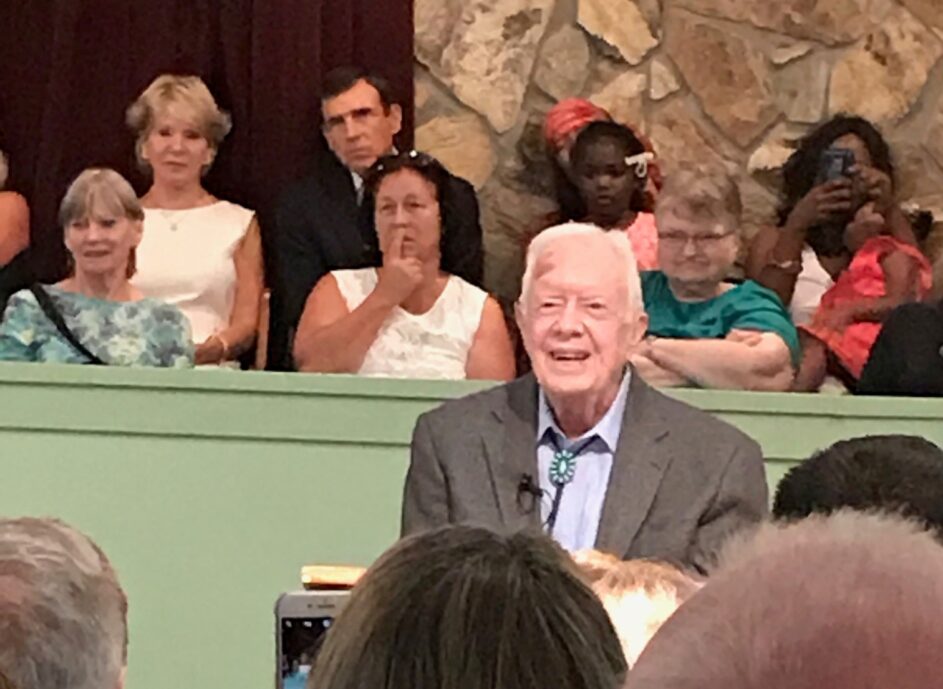Rob and Erin Frost and family slept in their car the night before they went to Sunday School at Maranatha Baptist Church. Seating was limited, and after driving all the way down from Knoxville to go to Jimmy Carter’s church, they weren’t about to risk being late.
The Sunday School class Carter taught had become one of the toughest tickets in the South. Over the years, thousands made their way to Plains, Georgia, until the former president’s declining health and Covid forced him to give up his Sunday gig in 2020. He was 95.

Rob Frost and Charlie Frost in front of Sonny Frost. Erin Frost to their right. Rosalynn Carter, Jimmy Carter. Rob’s sister Elizabeth Milling, nephew Tripp Milling, mom Judy Frost and brother-in-law James Milling. This photo was taken July 21, 2019.
The Frosts, who have a long family tradition of affiliation with the Republican Party, made a modern-day pilgrimage to sit in the presence of a man who was tossed out of office in semi-disgrace and then lived long enough to see himself become one of the most respected of Americans, maybe ever.
The late-blooming popularity of POTUS 39 bears witness to a slow and remarkable transformation that progressed for four decades. If there’s another former president who spent his twilight years as an unofficial living saint, I can’t think who it might be. (Note: I do not recall the term “POTUS” being widely used in Carter’s day – I doubt he has need for such an affectation.)

Wooden collection plate made by Jimmy Carter.
Insiders have reported that Carter was deeply depressed when he left the White House in 1981 after losing to Ronald Reagan in a landslide of historic proportions.
And no wonder: he had struggled with record high gas and oil prices that fueled skyrocketing inflation, as well as attacks from the newly motivated evangelical right wing. Remember Jerry Falwell and his Moral Majority? They saw no irony in supporting a divorced Hollywood actor with no discernable religious affiliation over a tee-totaling monogamist, washed-in-the blood family man. Little did we know where *that* tendency would eventually lead us.
For a while, Carter had Reagan attacking him from the right and Ted Kennedy ripping him from the left. Beleaguered doesn’t begin to describe the way he must have felt after being ridiculed for his church lady tendencies and efforts at energy conservation. Carrying his own bags and wearing a sweater were signs of weakness and made him the butt of a universe of bad jokes.
Those vexations were mere popcorn farts compared to the April 1980 desert dust storm that blew up just in time to dash any hope of rescuing the American hostages being held in Iran by radical Islamic student nationalists who demonstrated their fury at the newly deposed Shah being allowed to go to New York for cancer treatment. They overran the American embassy in the fall of 1979 and took 52 Americans prisoner. The hostage crisis lasted for more than a year and frustration with the president grew as time wore on.
Operation Eagle Claw was the kind high-risk, high-reward effort that Americans love – if we succeed. And we didn’t. A series of mishaps, beginning with the dust storm, cost the lives of eight American service members and Carter the presidency. Carter didn’t even get sympathy points when it was revealed that a Reagan campaign operative had colluded with the Iranian regime.
A few of the hostages escaped. The rest were released the day Reagan was inaugurated.
Americans do love a grand gesture, even when it’s highly scripted. In fact, we demand them, even if it’s just scripted words delivered on a compelling stage. Joe Biden’s sticking it to Putin in Kyiv will find a slot in our national memory alongside Reagan’s demand that Gorbachev tear down the Berlin Wall.
One of Carter’s goals through his foundation’s healthcare initiatives was to eradicate the Guinea worm, a hideous flesh-eating parasite that thrives in contaminated drinking water in remote African villages. He may have just done that.
But that’s not a grand gesture. Good thing that he doesn’t care about getting credit. He doesn’t have to wave a Bible around or talk about Two Corinthians. He just puts his faith to work and lives by his personal creed, which he adapted from Methodist Church founder John Wesley:
“Do all the good you can, by all the means you can, in all the ways you can, in all the places you can, at all the times you can, to all the people you can.”
Betty Bean writes a Thursday opinion column for KnoxTNToday.com.

